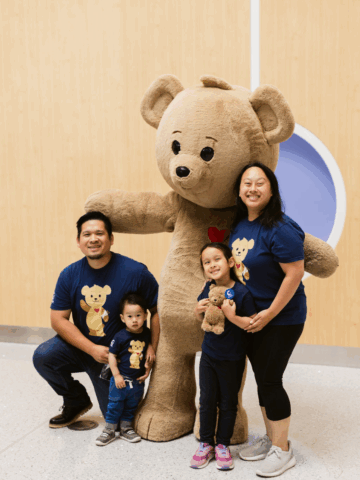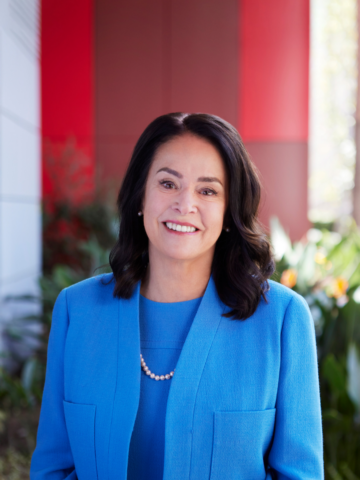Almost four years ago, when Angelyque Lorenzana joined CHOC, she arrived with a solid background in pediatric healthcare studies but no experience in epilepsy research.
Hired under the CHOC Research Institute specifically for epilepsy, Angelyque has flourished.
Currently, she now supervises two other epilepsy CRCs as the number of clinical trials and investigator-initiated studies has taken off under her leadership.
As a further exclamation point on the impact Angelyque has had at CHOC, she was recently elected to the board of directors of the Pediatric Epilepsy Research Consortium (PERC), a collaborative of more than 75 U.S. pediatric epilepsy centers and over 350 pediatric epileptologists, neuropsychologists, and pediatric epilepsy researchers.
Her three-year appointment to PERC is a sign of CHOC’s growing reputation as a leading center for pediatric epilepsy research.
“This is a huge honor for Angelyque in recognition of her outstanding work supporting epilepsy research at CHOC and across the PERC network,” said Virginia Allhusen, a CHOC research administrator. “I’m thrilled that she will be representing CHOC on this national stage amongst many of the leading epilepsy researchers in the country.”
Jane McCabe, executive director of PERC, said Angelyque’s commitment to PERC, her reputation within the pediatric epilepsy community, and her alignment with PERC’s mission, culture, and values will contribute to the consortium’s current and future success.
Loves her team
Angelyque came to CHOC from a private-practice pediatric neuro-optometry center near her hometown of Chicago where she conducted research on eye diseases like amblyopia and strabismus.
There, she also conducted vision therapy research and studies involving neuroplasticity, the ability of neural networks in the brain to change through growth and reorganization.
Now, at CHOC, Angelyque spearheads the development, communication and implementation of quality and regulatory compliance strategies for the epilepsy research program.
“I think I fell in love with epilepsy research because of the team I have here at CHOC,” she said. “At the end of the day, I believe in all the doctors and others I work with.”
In her role, Angelyque collaborates closely with internal and external stakeholders to discern and fulfill compliance prerequisites, devise comprehensive strategies to ensure the seamless execution and completion of research endeavors, and bolster policy and advocacy endeavors.
Her duties involve rare disease clinical trials, investigator-initiated studies, federally funded multicenter research initiatives, as well as projects in epilepsy research involving both devices and pharmaceuticals.
A well-respected manager
CHOC is a founding member of PERC and has played a role in many of its research projects and interest groups for more than a decade, with the participation of multiple CHOC epileptologists, said neurologist and pediatric epilepsy specialist Dr. Daniel Shrey.
“Angelyque has played an integral role in the logistics, execution, and success of the National Investigation of Multimodal Biomarkers for Infantile Spasms (NIMBIS) Study – a 20-center project amassing data on 560 children with new-onset infantile epileptic spasms syndrome which started within the PERC Infantile Spasms Interest Group and has been led by CHOC,” Dr. Shrey said.
“She has become well-known throughout PERC as a key player in epilepsy research, and her proven skillset as a research manager has become well-respected within the consortium,” he added.
Board members of PERC meet online every month and twice a year in person. Angelyque recently attended her first in-person board meeting in Washington, D.C.
“It was a little intimidating to be around so many brilliant minds in the field of epilepsy,” she said.
A growing portfolio
Angelyque earned an undergraduate degree in psychology from Concordia University Chicago and a graduate degree in clinical psychology from Roosevelt University, also in Chicago.
Back when she was in college, neuroscience and clinical research majors weren’t common. Now they are growing more in demand.
In fall 2020, when Angelyque joined CHOC, the epilepsy team was expanding its clinical research but did not yet have a large portfolio of projects.
Now it does, with nearly 15 clinical trials and a similar number of investigator-initiated studies. In addition, the epilepsy program has been the recipient of multiple Chief Scientific Officer (CSO) grants, an NIH-funded grant, and more.
“What we’ve been able to do in the past three-plus years has proven we are now a front-runner when it comes to pediatric healthcare systems and epilepsy research,” Angelyque said.
For example, in addition to Dr. Shrey’s NIMBIS study, which involves analyzing EEG and MRI, among other information, Dr. Donald Phillips is immersed in MERFISH analysis. That study involves using single-molecule imaging technology to analyze tissue in certain epilepsy patients to see if there’s a specific gene phenotype associated with the tissue, a process that hopefully will lead to better outcomes.
In another example, Dr. Virginia Liu is working on neonatal research and trying to come up with a better way of assessing newborns for epilepsy. She hopes a standardized tool will improve the process.
“Not all research needs to be cutting edge,” Angelyque notes. “Some of it needs to be focused on looking at the data that is in front of us, and understanding what we currently do and how can we improve upon our methods.”
A big goal
Angelyque said her goal is to create a “super center” for epilepsy research at CHOC that will transform it into a one-stop shop for patients and their families.
Epilepsy, she said, is a disease that is difficult to manage, and asking families to add another layer to it by enrolling their children in clinical trials and other studies can be challenging.
But without more research, Angelyque said, the field never will advance.
“It’s exhilarating to continue to learn more about where epilepsy research is headed,” she said.

Learn about pediatric research and clinical trials at CHOC




